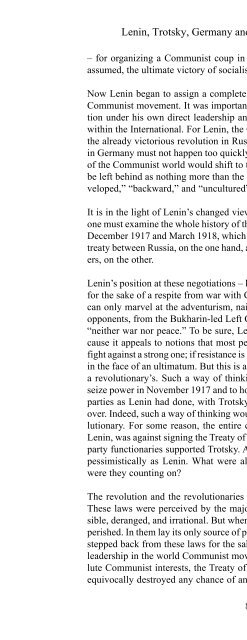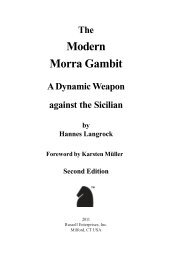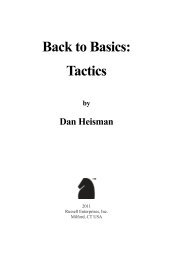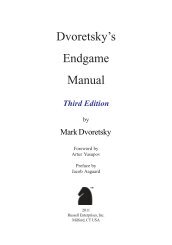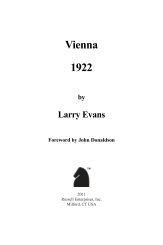Lenin, Trotsky, Germany and the Treaty of Brest-Litovsk The ...
Lenin, Trotsky, Germany and the Treaty of Brest-Litovsk The ...
Lenin, Trotsky, Germany and the Treaty of Brest-Litovsk The ...
Create successful ePaper yourself
Turn your PDF publications into a flip-book with our unique Google optimized e-Paper software.
<strong>Lenin</strong>, <strong>Trotsky</strong>, <strong>Germany</strong> <strong>and</strong> <strong>the</strong> <strong>Treaty</strong> <strong>of</strong> <strong>Brest</strong>-<strong>Litovsk</strong><strong>the</strong> acknowledged leader <strong>of</strong> <strong>the</strong> Left SR Party, was only a symbol, whose namewas successfully used for propag<strong>and</strong>a among <strong>the</strong> bottom ranks. As a party worker<strong>and</strong> tactician, however, Spiridonova could st<strong>and</strong> no comparison with <strong>Lenin</strong>.As we find nothing surprising about <strong>the</strong> rivalry between <strong>the</strong> Bolsheviks <strong>and</strong> <strong>the</strong>Mensheviks, who had initially belonged to a Social Democratic Party, we shouldnot be surprised by <strong>the</strong> split between <strong>the</strong> left wing <strong>of</strong> <strong>the</strong> SR Party <strong>and</strong> <strong>the</strong> SRParty itself. <strong>The</strong> first signs <strong>of</strong> this split appeared in 1915 in connection with differingattitudes toward <strong>the</strong> war. However, <strong>the</strong>se were not <strong>the</strong> same Left SRs – orat least, <strong>the</strong>se were not always <strong>the</strong> same Left SRs – who later formed <strong>the</strong> Left SRParty. Evidently, a party that included such dissimilar individuals as <strong>the</strong> Right SRMark Vishniak, on <strong>the</strong> one h<strong>and</strong>, <strong>and</strong> <strong>the</strong> extreme leftist Prosh Proshyan, on <strong>the</strong>o<strong>the</strong>r, could not survive <strong>the</strong> tumultuous events <strong>of</strong> 1917 <strong>and</strong> remain united. “<strong>The</strong>historical cause <strong>of</strong> <strong>the</strong> split... lies far beyond <strong>the</strong> boundaries our <strong>of</strong> party,” Kamkovwrote at <strong>the</strong> time. “It cannot be explained by <strong>the</strong> details <strong>of</strong> party politics. We aredealing with a specific, concrete instance <strong>of</strong> a broader, international phenomenon.<strong>The</strong> war vividly revealed <strong>the</strong> fact that contradictory elements had ended upwithin <strong>the</strong> same party, <strong>and</strong> <strong>the</strong>y could not but come apart.” 16<strong>The</strong> present work <strong>the</strong>refore touches only superficially on <strong>the</strong> causes for <strong>the</strong> departure<strong>of</strong> <strong>the</strong> left wing from <strong>the</strong> SR Party. <strong>The</strong>oretical disagreements, if we believethat any such disagreements existed, had little relation to <strong>the</strong> factual splitthat followed <strong>the</strong> fight for power waged by Left SR functionaries in <strong>the</strong> local <strong>and</strong>central governments in 1917-18. And it was not an accident that it was precisely<strong>the</strong> Left SRs’ recognition <strong>of</strong> <strong>the</strong> legitimacy <strong>of</strong> convening <strong>the</strong> Second Congress <strong>of</strong>Soviets (that is, <strong>the</strong> Bolsheviks’ seizure <strong>of</strong> power) that made <strong>the</strong> split between <strong>the</strong>Left SRs <strong>and</strong> <strong>the</strong> SR Party final. <strong>The</strong> struggle waged by <strong>the</strong> left wing <strong>of</strong> <strong>the</strong> SRParty for a place in <strong>the</strong> revolution <strong>and</strong> for power made <strong>the</strong> split inevitable.Nor does <strong>the</strong> present study investigate factors that might be characterized as “constants.”Among <strong>the</strong>se may be included Russia’s economic collapse, which grewworse with every month under Bolshevik rule; <strong>the</strong> anarchy due to <strong>the</strong> absence <strong>of</strong>a stable government in <strong>the</strong> country; <strong>the</strong> complete defenselessness <strong>of</strong> <strong>the</strong> peacefulpopulation in city <strong>and</strong> village before any armed force, as a result <strong>of</strong> <strong>the</strong> anarchy;<strong>and</strong> <strong>the</strong> famine <strong>and</strong> unemployment that spread as a result <strong>of</strong> <strong>the</strong> economic collapse.To this list might be added also <strong>the</strong> danger <strong>of</strong> engaging in counter-revolutionaryspeech. To a lesser degree before <strong>the</strong> Bolsheviks <strong>and</strong> <strong>the</strong> Left SRs came topower, <strong>and</strong> to a greater degree after <strong>the</strong>y did so, <strong>the</strong>se phenomena accompanied<strong>the</strong> Russian Revolution (just as <strong>the</strong>y had once accompanied <strong>the</strong> French Revolution)<strong>and</strong> were unlikely all that unexpected for Russian revolutionaries. Ra<strong>the</strong>r, itmight have seemed that all <strong>of</strong> <strong>the</strong>se perils should have united Russia’s socialistparties, forcing <strong>the</strong>m to form a “homogeneous socialist government” (which wasadvocated by <strong>the</strong> SRs, <strong>the</strong> Mensheviks, <strong>and</strong> <strong>the</strong> labor unions, <strong>and</strong> opposed socategorically by <strong>Lenin</strong> <strong>and</strong> <strong>Trotsky</strong>). However, what <strong>Lenin</strong> cherished most wasnot <strong>the</strong> socialist revolution in general, but <strong>the</strong> socialist revolution under his own14


